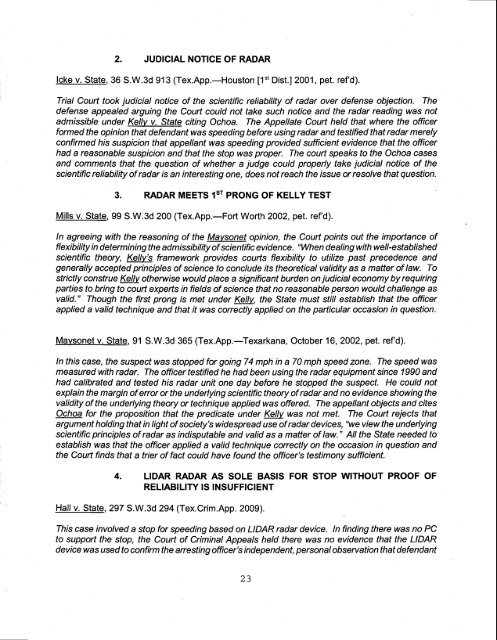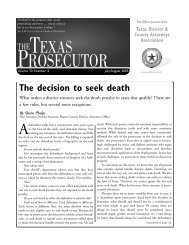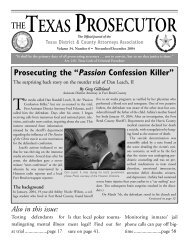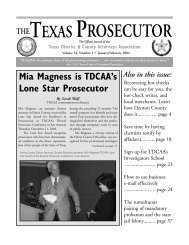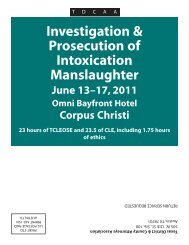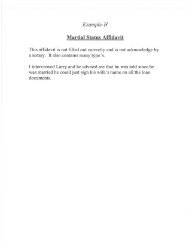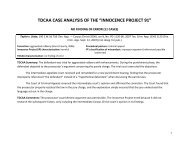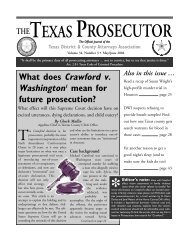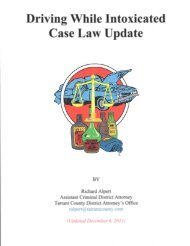Driving While Intoxicated Case Law Update - Texas District ...
Driving While Intoxicated Case Law Update - Texas District ...
Driving While Intoxicated Case Law Update - Texas District ...
- No tags were found...
You also want an ePaper? Increase the reach of your titles
YUMPU automatically turns print PDFs into web optimized ePapers that Google loves.
2. JUDICIAL NOTICE OF RADARlcke v. State,36 S.W.3d 913 (Tex.App.-Houston [1"tDist.] 2001, pet. ref'd).Trial Court took judicial notice of the scientific reliability of radar over defense objection. Thedefense appealed arguing the Court could not take such notice and the radar reading was notadmissible under Kellv v. State citing Ochoa. The Appellate Court held that where the officerformed the opinion that defendant was speeding before using radar and testified that radar merelyconfirmed his suspicion that appellant was speeding provided sufficient evidence that the officerhad a reasonable suspicion and that the stop was proper. The court speaks to the Ochoa casesand comments that the question of whether a judge could properly take judicial notice of thescientific reliability of radar is an interesting one, does not reach theissue orresolve that question.3. RADAR MEETS 1ST PRONG OF KELLY TESTMills v. State, 99 S.W.3d 200 (Tex.App.-Fort Worth 2002, pet. ref'd).In agreeing with the reasoning of the Mavsonet opinion, the Court points out the importance offlexibility in determining the admissibility of scientific evidence. "When dealing with well-establishedscientific theory, Kellv's framework provides courts flexibility to utilize past precedence andgenerally accepted principles of science to conclude its theoretical validity as a matter of law. Tostrictly construe Kelly otherwise would place a significant burden on judicial economy by requiringparties to bring to court experts in fields of science that no reasonable person would challenge asvalid." Though the first prong is met under Kellv. the State must stillesfabfish that the officerapplied a valid technique and that it was correctly applied on the particular occasion in question.Mavsonet v. State, 91 S.W.3d 365 (Tex.App.-Texarkana, October 16,2002, pet. ref'd).ln this case, the suspecf was sfopped for going 74 mph in a 70 mph speed zone. The speed wasmeasured with radar. The officer testified he had been using the radar equipment since 1990 andhad calibrated and fesfed his radar unit one day before he stopped fhe suspect. He could notexplain the margin of error or the underlying scientific theory of radar and no evidence showing thevalidity of the underlying theory or technique applied was offered. The appellant objects and citesOchoa for the proposition that the predicate under Kellv was not meL The Court rejects thatargument holding that in light of society's widespread use of radar devlces, "we view the underlyingscientific principles of radar as indisputable and valid as a matter of law." Allthe State needed toestablish was that the officer applied a valid technique correctly on the occasion in question andthe Court finds that a trier of fact coutd have found the officer's testimony sufficient.4. LIDAR RADAR AS SOLE BASIS FOR STOP WITHOUT PROOF OFRELIABILITY IS INSUFFICIENTHalf v. State, 297 S.W.3d 294 (Tex.Crim.App. 2009).Ttis case involved a sfop for speeding based on LIDAR radar device. ln finding there was no PCto supporthe stop, the Court of Criminal Appeals held there was no evidence that the LIDARdevice was used fo confirm the arresting officer's independent, personal observation that defendant23


